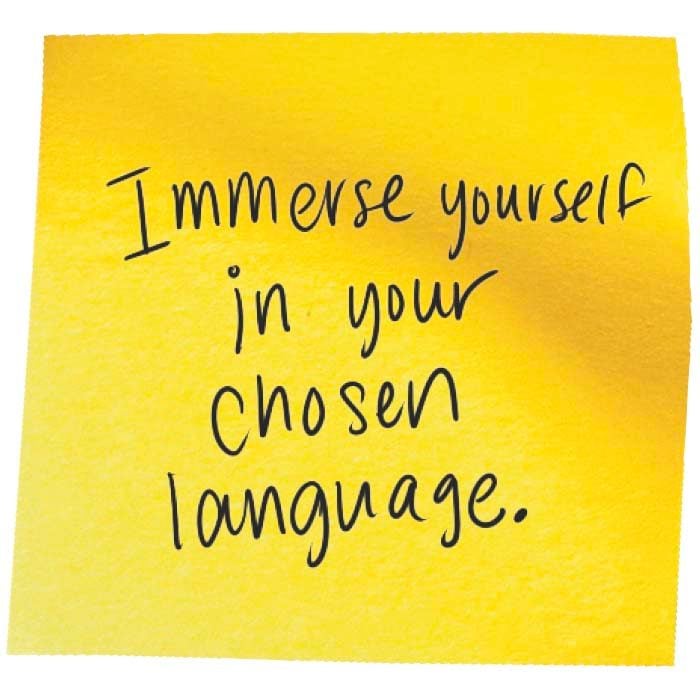How to Learn a New Language as an Adult
Updated: Aug. 17, 2022

Contrary to conventional thinking, it's never too late to learn a new language—use these tips to get started
For more than two years, Dulcie Shoener of Milwaukee, Wisconsin, has done daily German lessons on her smartphone. To some, that might sound like self-imposed homework, but Shoener, a language lover and the copy chief for Reader’s Digest and other publications, doesn’t see it that way. “I enjoy it so much,” she says. “It’s a delight to be able to read a short story in German.”
To be able to read, write or carry on a conversation in another language is a feat few Americans attempt, let alone achieve. Just 7% of our university students study a language other than English, and less than 1% of American adults are proficient in a foreign language they studied in school. Of her college German, Shoener says, “I remembered very little.”
Yet the rewards for those who do learn a second (or third, or fourth…) language are profound: increased travel opportunities, of course, but also improved memory, focus and ability to multitask. Bilingual brains are better shielded against cognitive disorders such as Alzheimer’s disease. And according to a poll conducted by the language app Babbel, knowing multiple languages can make you more attractive.
Why aren’t more people multilingual?
So, why aren’t more of us multilingual—or trying to be? There are dozens of decent answers to that question, but one common retort doesn’t have much merit at all: the idea that adults, especially older ones, just can’t learn languages as easily as children can.
Linguists have long debated how old is too old to acquire a language, but newer research is refuting the idea wholesale. “There is no magical point at which it becomes impossible to learn a new language,” says Alison Gabriele, PhD, of the University of Kansas, who led a study published last year showing that adult learners—even as beginners—could process sentence structures in new languages much like native speakers. Separate research at Cambridge University recently found that language instruction affects adults and children the same way.
While it’s true that children tend to pick up new languages quickly and easily, this has more to do with how they learn than how old they are when they do. Kids absorb and infer lots of information about language simply by listening to family, friends, teachers and the media around them. It happens without much thought or effort on their part, and when they do put in effort, it’s because they want to understand the story, joke or game that’s going on.
By contrast, adults tend to learn in rigid academic settings where they have little say in what they study and where the stakes are also higher. What Shoener can recall from her German classes is the pressure to maintain her grade point average. “I was horrified of making mistakes,” she says. “Now I’m not afraid, and I know I’m doing better than I did in college.”
How to learn a new language
If you dream of being bilingual, your age does not disqualify you. Make the process more fun—and, by extension, more successful—with these tips:
Find your motivation to learn a new language
Wish you had paid more attention in high school Spanish? Consider why you didn’t. Perhaps all you wanted out of the class was a good grade, or to fulfill a graduation requirement. Linguists call these incentives “extrinsic motivators,” but the most successful language students are “intrinsically” motivated, sincerely invested in their own learning. So pick a language you are excited to use, whether on a grand vacation or on your couch watching foreign-language soap operas.
Pick your tools (like a language learning app)
It might take some trial and error, but you’ll figure out which resources work best for you. Mobile apps such as Duolingo and Babbel gamify your learning, so if you could easily spend hours playing on your phone, you’ll likely find these similarly addictive. Others such as Rosetta Stone and Pimsleur are less gimmicky but more rigorously researched.
Consider a conversation-based class on Italki or Idlewild. And don’t neglect books. McGraw Hill and Barron’s offer excellent textbooks, grammar guides and workbooks with answer keys to let you see how you’re doing. But you may enjoy children’s stories more, with their simple vocabulary and easy-to-understand narratives.
Dive into learning a new language
Immerse yourself in your chosen language as much as you can. Watch movies or listen to songs, even if they are just on in the background. Periodically look around you and see how many things you can name in the language you’re studying. Or, better yet, label items around your home with those words. You’ll have no choice but to see them and, in very little time, learn them.

Get social while learning your new language
Practicing with other people helps solidify what you’ve already learned and makes you more aware of which ideas you’re able to express. These need not be native speakers you chat with, though various websites and apps such as languageexchange.com, HelloTalk and TalkAbroad can connect you with some, either free or for a small fee.
Don’t sweat your language learning mistakes
Kids get it wrong all the time. They’ll say, for instance, that they “goed” to school and played with other “childs.” But inherent in these errors is an understanding of the general rules: We use “-ed” as a suffix to put an action in the past, we add “-s” to make things plural and so on. Although kids often misapply these rules, they pick up on the patterns and use them in novel situations. This is what successful learners do when figuring out how to learn a new language.
Sometimes you’ll miss the mark as you unknowingly stumble on an irregular verb or an exception to the rule. But more often you’ll be right. And even when you do falter, those who are fluent should still be able to understand what you mean.
Try less when learning a new language
It seems counterintuitive, but you’re more receptive to pick up on language patterns when you aren’t hyperfocused on learning them. So rather than stare intently at a vocabulary list when learning, glance over the words while you listen to instrumental music. Or enjoy a glass of wine ahead of conversation practice—research at the University of Liverpool has shown that our ability to speak a second language improves after a bit of alcohol. Or turn on subtitles in the language you’re learning even as you watch TV in English.
Don’t devote your full attention to them—just enjoy the show and absorb what you can. The less you stress, the more you’ll be able to learn.


